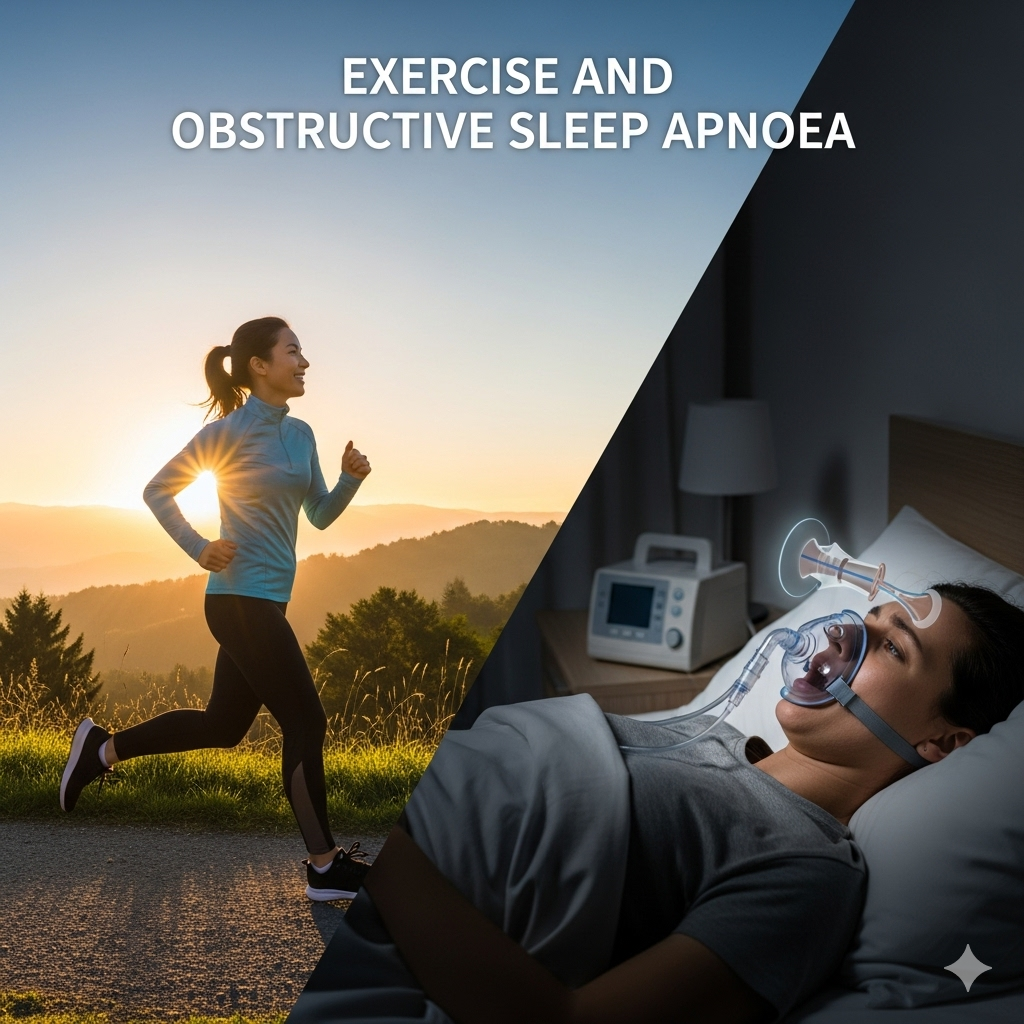
10 Sep Exercise and Obstructive Sleep Apnoea (OSA)
Overview
Sleep and exercise are two foundational pillars of health. When impaired, each can significantly contribute to a decline in overall wellbeing. Importantly, they also interact closely—improvements in physical activity have been shown to positively impact sleep quality and the severity of sleep disorders such as obstructive sleep apnoea (OSA), independent of weight loss.
- Western Australian Sleep Health Study
- Large cross-sectional study of Australian adults.
- Vigorous physical activity in men and occupational activity in women were linked to lower odds of moderate-to-severe OSA.
- Exercise reduced inflammation (CRP) and improved cardiometabolic health.
- 2024 Meta-Analysis of Exercise Interventions
- Review of 11 RCTs (global), showing aerobic exercise reduced AHI by 5–11 events/hour.
- Best results with 70–100 mins/week of moderate aerobic activity for ≥12 weeks.
- Improvements seen independent of BMI changes.
The Effect of Exercise Training on OSA and Sleep Quality Exercise is not just supportive lifestyle advice—it is an evidence-based adjunct to OSA treatment, improving both AHI and sleep quality, even when weight remains unchanged. For patients struggling with CPAP or at early OSA stages, physical activity should be actively encouraged.
- The Effect of Exercise Training on OSA and Sleep Quality
In 2011, (Kline, C & et al) conducted a
- Randomized controlled trial which saw 43 sedentary and overweight/obese participants, aged 18-55 years with at least moderate obstructive sleep apnea (OSA), apnea-hypopnea index (AHI) ≥ 15, completing a 12-week exercise program.
- Results demonstrate that exercise significantly decreased the Apnea-Hypopnea Index (AHI) in the intervention group compared to the control group, which performed basic stretching. This reduction in AHI is particularly noteworthy as it occurred without a corresponding change in participant body weight. Given that obesity is a primary contributing factor to the development and severity of OSA, these findings underscore the potent impact of exercise on mitigating OSA severity, independent of weight loss.
- The intervention demonstrated that the exercise group reported significantly improved sleep quality compared to the control group. This suggests that exercise alone has a positive impact on sleep quality, independent of weight loss. Furthermore, combining long-term exercise with a diet promoting steady weight loss would likely lead to even greater improvements in OSA severity and overall sleep for these participants.
References
Simpson L, McArdle N, Eastwood PR, Ward KL, Cooper MN, Wilson AC, Hillman DR, Palmer LJ, Mukherjee S. Physical Inactivity Is Associated with Moderate-Severe Obstructive Sleep Apnea. J Clin Sleep Med. 2015 Oct 15;11(10):1091-9. doi: 10.5664/jcsm.5078. PMID: 26285117; PMCID: PMC4582050
Iftikhar, I. H., Reynolds, A. M., AlBisher, E., Youngstedt, S. D., & BaHammam, A. (2024). Aerobic exercise training and obstructive sleep apnea: dose-response meta-analyses. Sleep and Breathing, 28(6), 2355-2366. https://doi.org/10.1007/s11325-024-03158-2
Kline, C. E., Crowley, E. P., Ewing, G. B., Burch, J. B., Blair, S. N., Durstine, J. L., Davis, J. M., & Youngstedt, S. D. (2011). The effect of exercise training on obstructive sleep apnea and sleep quality: a randomized controlled trial. Sleep, 34(12), 1631–1640. https://doi.org/10.5665/sleep.1422

